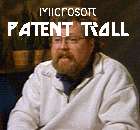06.07.11
Posted in Bill Gates, GNU/Linux, Google, Hardware, Microsoft, Patents at 3:52 am by Dr. Roy Schestowitz

Summary: Microsoft performs an MSDOS (Multi-Source Denial of Service) attack on Linux and on Android, using patent monopolies and patent trolls
FURTHER to the previous post, there is abundant evidence that the USPTO is broken as it fails to meet its goals. There is no such thing as a “quality” patent. A patent is a monopoly and all those applying to software impede the use of logic and mathematics. Here is another interpretation of the SCOTUS ruling, which we wrote about a few days ago (EN, ES). The Register reads that as follows:
In a case supported by HP, eBay, Red Hat, Yahoo!, and General Motors, the US Supreme Court has issued a ruling that may make it more difficult for a company to be sued for inducing another company to infringe a patent.
According to the ruling, a defendent accused of inducing patent infringement must be proven to have either known that it was infringing, or was “willfully blind” to that infringement. Actual knowledge of infringement can be proven through documentary evidence or sworn testimony.
That again does not address the main issues with the patent system — issues that even the Bilski case in SCOTUS failed to resolve. Let us look at some of the latest casualties based on this week’s news.
Twitter made it clear that it is against software patents and now it is being attacked by patent trolls again. Patent trolls are, statistically speaking, greatly dependent on software patents.
A patent troll called Kootol Software has put Twitter on alert. The ‘company’, which sports a corporate logo (and name) that is suspiciously reminiscent of Google’s, this morning said it has sent a caution notice to Biz Stone, Jack Dorsey and co to express “concerns” about possible intellectual property violations.
Quoting the original source (“Twirpy Patent Troll Threatens Twitter”), TechCrunch/AOL says:
The patent application in question (a patent number hasn’t been assigned yet) is titled “A Method and System for Communication, Advertising, Searching, Sharing and Dynamically Providing a Journal Feed.”
They are making it extremely complicated for software developers to develop in peace and it is only getting worse when people make money from the illness of this system. This incentivises keeping it broken. Jan Wildeboer, who is one of the most prominent among opposers of software patents in Europe, notes that some people built entire enterprises based on exploitation of the patent system’s loophole. He asks: “Is Myhrvolds Intellectual Ventures using patents CDO style to disrupt the market? Lodsys as example?”
He also asks: “Is Lodsys sign of new time? 1. License patents 2. Sell patent 3. New buyer tries licensing again? Patents == CDB business?”
Remember what the world's biggest troll (who came from Microsoft) said before he gave this patent to Lodsys. “Intellectual property is the next software,” he argued. Microsoft and him are in this together. Bill Gates is a close affiliate of this shakedown and Matt Asay challenges this by going back in time (back to the days when Gates denounced patents, as a small player):
Microsoft, once the ruler of the software universe, doesn’t even make Google executive chairman Eric Schmidt’s Gang of Four influential tech companies. It’s not that Microsoft has lost its ambition. But it may be that Microsoft’s ambition has changed, and for the worse.
Microsoft once prided itself on minting profits from licensing copies of Windows and Office. Now it seems more content with eking out $5 per unit from HTC and others it bullies over patents. That’s right: instead of selling product, it’s peddling intellectual property (IP).
We wrote about this extortion before. Not only Microsoft is extorting HTC; it seems as though Intellectual Ventures does too. Another person from Microsoft, Paul Allen of Interval the patent troll, is still attacking many parties including Android/Google for merely implementing some ideas. “People Concerned About Paul Allen’s Ridiculous Patent Claims Gets USPTO To Begin Re-Exams Of His Patents,” says TechDirt. To quote:
Last year, we covered Paul Allen’s ridiculous patent lawsuit against a ton of tech companies. He claimed that all of these companies violated four incredibly broad patents he held:
* 6,263,507: “Browser for use in navigating a body of information, with particular application to browsing information represented by audio data.”
* 6,034,652 & 6,788,314 (really the same patent, involving continuations): “Attention manager for occupying the peripheral attention of a person in the vicinity of a display device”
* 6,757,682: “Alerting users to items of current interest”
Groklaw follows this case quite closely, or at least it used to. What the Microsoft people do (even those who left the company) is what Microsoft has always done, They want to tax everything sold rather than really make anything of value. They are waging legal wars and amassing patents that they lobby for, in order to increase their value.
Right now it seems like Microsoft is hunting for Nokia’s patent so that it can tax all mobile phones. Nokia is of value to Microsoft because of its software and hardware patents; we wrote so much about it that we need not repeat the evidence of this. This is a subject that we talked about in IRC the other day. Assuming Microsoft wants to ‘pull a CPTN’ on Nokia, it will be more about use of Nokia’s patents offensively and exploitation of Nokia’s brand (like Yahoo! and Novell). By sending out moles Microsoft just improves its chances of becoming the patent receiver. Watch how Microsoft put its mole in: [via F. Cassia]
Steve Ballmer was so determined to get Nokia on board with Windows Phone 7, he sent a super-extended prom-style limo to pick up Nokia’s Stephen Elop and other execs when they visited the Seattle area.
That’s one of the revelations in Businessweek’s long profile of Elop’s first six months at the company.
Microsoft is crushing Nokia as this may help Microsoft pick it up cheaply along with its patents. Considering what has happened so far, Elop did a wonderful job (for Microsoft, of which he is a top shareholder). The deal made no sense and it was signed in a rush by the two Stephens who are former colleagues. Watch Ye Booke of Elop for a funny slant. It is clear what’s going on there, but there is nothing amusing about it. Nokia represents the latest victim in the line of corpses left by Microsoft’s abusive-aggressive behaviour. Nokia was becoming a Linux company just before Microsoft put a mole inside it. “Elop” is “Pole” backwards and Microsoft put its Pole inside Nokia, to borrow Brandon’s joke. Rather than have MeeGo and LSB in Nokia, we now have another Microsoft ally out there, threatening to use its patents and promising to deliver a ‘new’ OS some time later this year (at which point Nokia will be ripe for picking by another company). The Linux Foundation’s head was very disappointed by this and it is easy to see why. Nokia was a valuable contributor to the Linux Foundation and its site has a new comic regarding software patents. It can be found here. Somehow Microsoft turned several Linux-friendly companies like Nokia, Yahoo!, and Novell into Microsoft boosters (former Microsoft partner Bartz did nothing of value except shake Ballmer’s hand, just like Elop). Some people still foolishly question what makes Microsoft so much more malicious than other companies of a similar scale. Microsoft is very, very destructive. It just doesn’t give a damn. █
Permalink
 Send this to a friend
Send this to a friend
Posted in GNU/Linux, Google, Hardware, Microsoft at 2:41 am by Dr. Roy Schestowitz

Summary: Analysis of the changing face of the computers market as mobile devices grow ever more powerful
THE market is changing quickly. All those who predicted Linux “world domination” are becoming rather proud while those who discouraged them probably eat humble pie. The revolution may not be known as “Linux” because the trademarks issue means that each supplier of Linux (HP, Google, IBM, etc.) wants brand control. This is fine. What remains to be challenged right now is the subject and existence of software patents. Except for the “desktops” we now have the fast-growing market of tablets and phones, though patents are ruining this market. It is very easy to see that in the news, which we will address later.
Cringely is one among the many pundits who comment on Microsoft’s demise amid all these transitions between form factors and operating systems. He notes:
Look at the downward price erosion of Microsoft Office caused by a combination of Open Office and iWork, which is down to $30 on the iPad. How long will it be until Apple is giving iWork away to sell hardware — an option Microsoft doesn’t have? Not long. By then a bit more of Redmond’s goose will have been cooked.
Indeed. One of our longtime readers has done some analysis and surveyed the news on this matter, arriving at the conclusion that “Skipping the problems with Apple’s stance on Software Freedom for a moment, it is now worth more than Microsoft and Intel combined.[1] I hope that can change (back) to better architectures. The link Masters Tournament[2] has this quote from Mr “The Internet is just a passing fad”:
“What I can’t figure out is why he (Steve Jobs) is even trying (to be the CEO of Apple)? ” wondered Bill. “He knows he can’t win.”
“What a visionary,” adds our reader.
His links are as follows:
[1] http://www.theregister.co.uk/2011/06/04/apple_passes_microsoft_and_intel_in_market_cap/
[2] http://www.cringely.com/2010/04/masters-tournament/
“An aside,” he adds, “I notice that TheReg uses the MS talking point of calling all non-MS gain ‘schadenfreude’ to spin the gain as other than gain for Apple.
“This article caused a ‘Softer to get his knickers in a twist and attack:
http://www.theregister.co.uk/2011/06/04/apple_passes_microsoft_and_intel_in_market_cap/
“So I’d say, despite the DRM and other shortcomings of Apple, it’s worth pursuing a little.”
“Apple now worth more than Wintel (Microsoft and Intel combined)”
http://macdailynews.com/2011/06/03/apple-now-worth-more-than-wintel-microsoft-and-intel-combined/
“The numbers speak for themselves:
http://finance.yahoo.com/q?s=AAPL
vs
http://finance.yahoo.com/q?s=INTC
http://finance.yahoo.com/q?s=MSFT
“MS @ $201.59bn + Intel @ $115.21bn = $316.8bn.
“Apple =$317.6bn.
“Unfortunately, Intel also gets a piece of Apple since it (unwisely)
dropped PPC in favor of Intel Core.
“So, Apple @ 317.6bn + Intel @115.21bn = 432.81bn
“432.81bn > 316.8bn
Regarding what he mnemonically abeled the “Wintel vs Macintellintosh” battle, he concludes:
“The other way to do it is to compare the two without Intel, since it cancels out anyway. That gives an even sharper difference:
“Apple @ 313.6bn > MS @ 201.6bn
On another note, adds this reader: “PXE 5462 is probably not worth a post in and of itself. It does contain a tidbit where MS staff try to negotiate a deal with Stac to exclude IBM.
http://www.groklaw.net/pdf/iowa/www.iowaconsumercase.org/011607/5000/PX05462.pdf
As we showed last week on several occasions, Microsoft is now trying to sabotage Linux and Apple business at the hardware level, but it is not quite working and the hardware makers are snitching, complaining about Microsoft. █
Permalink
 Send this to a friend
Send this to a friend
06.02.11
Posted in GNU/Linux, Google, Microsoft, Patents at 3:45 pm by Dr. Roy Schestowitz

Summary: Further discussion about Microsoft’s attacks on Linux through known proxies
AS we showed earlier this year and beforehand, Microsoft’s former CTO had extorted Android makers using the patent pile he had accumulated with financial help from Bill Gates and Microsoft. We have already alluded to Apple’s role in it, which ought to tell iPhone/iPad developers that they should rebel against Apple, not ask for Apple’s help. As Jan Wildeboer has just put it, not only does Microsoft’s former CTO dodge the issue; Pro-Microsoft charlatan Florian Müller too is hiding this fact while also being regularly challenged (by yours truly too) to denounce Intellectual Ventures.
Did @fosspatents inform that the lodsys patent was formerly owned by Intellectual Ventures? Whereever there’s a #swpat case, MSFT is close.
Nothing ever changed at Microsoft. It is a bunch of manipulative sociopaths who use proxies to wage their wars. Let us remember that Intellectual Ventures has become notorious for passing patents to wage wars too (in case someone, for example, does not accept its taxing scheme). Speaking of proxies, we opine that amid the turmoil at Nokia, “Microsoft wants to destroy Nokia and get its *hardware* patents cheaply (not just software patents) to extort *all* Android sellers.” (to quote my latest dent) Or as Malroy put it, “Nokia thanks to the efforts of the Trojan Elop, has become like a pair of Soviet era made shoes — worth more for the parts used than the finished pair of shoes.”
Microsoft did the same thing to Yahoo! and to Novell, which is now owned by a partner of Microsoft along with the UNIX assets. Scary, eh? Microsoft’s buddy/mate Attachmate is scary enough as an owner of UNIX, so Pamela Jones came back from her retirement phase just to post this article titled “What Unix Copyrights Does Novell Own?”
Before I passed the reins of Groklaw content to Mark Webbink, I had obtained some additional early AT&T/Regents of California documents from the University of California. Thanks to Mark, I finally had time to scan them in and upload them and add them to Groklaw’s permanent collection. I’d like to share some highlights with you, at his request.
What stands out to me the most is that AT&T licensed BSD code from the Regents, repeatedly and very early. I will show you the agreement. And another document confirms that AT&T didn’t register copyrights on 32V, relying on trade secret protection only, back when you had to take certain steps to own valid copyrights.
Novell, now Attachmate, may think it owns all the pre-1995 UNIX copyrights, thanks to Novell’s victory over SCO at trial, but all that was established at trial was that Novell did not *transfer* any pre-1995 copyrights it owned to SCO. The trial didn’t parse out and establish what precisely Novell owned, what it had obtained from AT&T in the first place, or what AT&T owned, for that matter.
Salesforce’s CEO said that Microsoft is "somewhat disgusting”, but we would rather just say that Microsoft is manipulative and it is trying to use all sorts of intellectual monopolies right now, obviously to derail the inevitable domination of Linux. Microsoft has already destroyed Novell using a patent deal. SLE* is still Microsoft’s (and Attachmate’s) tool for replacing Red Hat systems, for example, with Microsoft-taxed GNU/Linux. Meanwhile, despite another milestone, OpenSUSE gets neglected and with the exception of some hype about World IPv6 Day, there is almost not a word about it. Proprietary software like Vibe is all we have left from Novell in YouTube (many new videos from Novelldemo, such as this one).
Say no to software patents and help end the destructive nature of the Microsoft thugs, who are no longer just inside Microsoft (some formed the world biggest patent troll, Intellectual Ventures, while others founded a media-meddling patents booster known as “Gates Foundation”).█
Permalink
 Send this to a friend
Send this to a friend
06.01.11
Posted in GNU/Linux, Google, Hardware, Microsoft at 11:51 am by Dr. Roy Schestowitz

Summary: Microsoft is blocking Linux/Android by giving “incentives [...] in exchange for accepting the restrictions”
From Dina Bass (Microsoft sympathiser) and her colleagues we now learn more about an issue we covered last night. From the new article: [thanks to Will for the link]
Microsoft Corp. (MSFT) has asked chipmakers that want to use the next version of Windows for tablets to work with no more than one computer manufacturer, three people with knowledge of the plan said.
Chipmakers and computer makers that agree to the terms will get incentives from Microsoft in exchange for accepting the restrictions, which tie a single chipmaker to one tablet design, said the people, who declined to be identified because the new program hasn’t been made public.
[...]
Under the plan being proposed by Microsoft, a given chipmaker would have to ally itself with a single PC manufacturer in order to qualify for certain incentives. Those may include features that ensure the device runs better or lower prices for the software, one of the people said.
Acer Inc. (2353) Chief Executive Officer and Chairman J.T. Wang, in an interview yesterday at the Computex trade show in Taipei, said Microsoft was trying to set limits on other companies. He didn’t specify the restrictions.
“They’re really controlling the whole thing, the whole process,” Wang said of Microsoft. “They try to set the game rules,” he said, and chip suppliers and PC makers “all feel it’s very troublesome,” he said.
Are the regulators paying attention? Microsoft seems to be breaking the law again, not just with blackmail. Microsoft used the same anti-competitive and consumer-hostile strategy when GNU/Linux was thriving on sub-notebooks. If this is not a violation of the law, it should be. It corrupts the free market, it is a form of collusion. Intel got brutally nailed for such crimes (before it paid AMD to keep silent on this matter).
The above restrictions are not intended to prevent tablets from cannibalising Windows sales on the desktop because almost no tablets run Windows (and Acer does not preinstall Mac OS X). That’s just spin on Microsoft trying to assassinate competitors, notably Linux. █
Permalink
 Send this to a friend
Send this to a friend
05.31.11
Posted in GNU/Linux, Google, Microsoft, Patents, Windows at 8:33 pm by Dr. Roy Schestowitz

Summary: Microsoft is destroying independence in the OEM market (for everyone) in order to ensure that Linux suffers artificial limitations and that Windows monoculture stays for a while longer
WINDOWS is in trouble and “Microsoft [is] Worst Performing Dow Component,” says this new headline (kudos to Chips B. Malroy for the pointer).
Since Windows profits are declining [1, 2] Microsoft has decided to become a super-abusive monopolist again, but almost nobody notices.
Microsoft not only enjoys the privilege of using blackmail to monetise Linux/Android (which in itself is probably a violation of some laws as extortion [1, 2, 3, 4, 5, 6, 7] is covered by the RICO Act). According to reports, Microsoft is now also distorting the hardware market, just as it did when GNU/Linux was thriving on sub-notebooks. We wrote about it in a lot of posts around 2008 and 2009.
Using manipulative tactics that should be investigated promptly, Microsoft is trying to discourage the use of Android on form factors favourable to that platform. It shows how miserable Microsoft has become, descending to a competition at the hardware layer. The company has lost the plot and even Microsoft boosters like Paul DeGroot [1, 2, 3, 4] continue to acknowledge the problem with “Software Assurance” for example (lock-in by choice, which businesses no longer accept). Found via this blog was this report from Bloomberg. Malroy has surveyed the material, quoting an interesting post titled “Acer: Microsoft hardware rules ‘very troublesome’” (watch out for Microsoft MVPs in the comments because we see them there).
“They’re really controlling the whole thing, the whole process – all feel it’s very troublesome,” to put that title in context. “However, if the restrictions are designed to hobble tablets to prevent them cannibalizing Windows PC sales (something we’ve seen Microsoft do to netbooks), then that’s definitely not good for consumers.” B&N complained about it too.
“MS hopes to control the hardware that is produced and therefore also what hardware that Android goes on as well”
–Chips B. Malroy“Ask why Windows Tablets did not do well back in Gates day? They have been out for a long time,” remarks Malroy. “Could it be that Bill wanted them to run on a laptop that cost four times as much? Sure would make it easy to hide the price of windows on those. Fujitsu lifebooks were some of the old tablets or touch screen laptops [...] MS simply did not have any motive for tablets to replace the current model PC. Unless the price was more so they could raise the price of windows. [...] And we know how well those tablets sold. It will be hard to hide the price of windows on a $200 computer” (not to mention what they do with patents)
“MS hopes to control the hardware that is produced and therefore also what hardware that Android goes on as well,” Malroy explains. “This appears to be some sort of anticompetitive move by MS” (for sure).
Malroy quotes the original: “Microsoft is rushing to release a version of Windows compatible with chip technology from ARM Holdings Plc (ARM) so Windows-based tablet computers can compete with Apple’s iPad, which controls an estimated 64 percent of the tablet market.”
He remarks: “notice the keyword here, rushing. MS is ‘rushing’ out windows 8 on an unwary public [...] but perhaps MS does it best work when they rush something out? After all they had 5 to 7 years to get Vista out the door, and it was still rushed. If they truly rush out a reused product like windows, they have less time to harm it” (see our page about “Microsoft’s Fight Against Sub-notebooks and GNU/Linux at ASUS”). █
Permalink
 Send this to a friend
Send this to a friend
Posted in Google, Microsoft, Security, Windows at 1:11 pm by Dr. Roy Schestowitz
“In one piece of mail people were suggesting that Office had to work equally well with all browsers and that we shouldn’t force Office users to use our browser. This Is wrong and I wanted to correct this.
“Another suggestion In this mail was that we can’t make our own unilateral extensions to HTML I was going to say this was wrong and correct this also.”
–Bill Gates [PDF]
Summary: Why Internet Explorer should be a candidate for exclusion if not banning, especially given that Microsoft knowingly ignores security problems that in turn pass the cost to society, collectively
Negligence is a matter of routine at Microsoft, but this is a subject we wrote about many times before (e.g. [1, 2, 3]), so we shall look at this from another angle today.
Microsoft desperately wants its Internet Explorer (IE) monoculture back. It uses many dirty tricks to get there and around my house there are many billboards promoting IE this year. It is not something that Mozilla, for example, can afford. But the reality is that Microsoft deliberate and well-understood negligence is costing everyone a lot of money. A couple of years ago a lot of businesses including Google got burned by users and/or staff that insisted on using IE. As a result, Google essentially banned Windows and the damage to the economy was great, not to mention the effect on national security (Wikileaks released cables related to this).
Only a monopoly can get away with it, but it does not escape scrutiny from the journalist who likes to expose Microsoft security problems:
Microsoft today downplayed the threat posed by an unpatched vulnerability in all versions of Internet Explorer (IE) that an Italian researchers has shown can be exploited to hijack people’s online identities.
The bug, which has been only discussed and not disclosed in detail, was part of an attack technique described by Rosario Valotta, who dubbed the tactic “cookiejacking,” a play on “clickjacking,” an exploit method first revealed in 2008.
At Microsoft they simply hide the vulnerabilities in order to pretend that these do not exist. By silently patching in addition to secrecy and evasion, Microsoft can also game the numbers and fraudulently claim that Windows is more secure. █
Permalink
 Send this to a friend
Send this to a friend
05.27.11
Posted in GNU/Linux, Google, Microsoft, Patents at 4:28 am by Dr. Roy Schestowitz
Usando las patentes de software, Microsoft convierte a Linux en su propia fuente de ingresos, mientras que también por lo que es más caro.

(ODF | PDF | English/original)
Resumen: El impuesto sobre «lucha contra el ‘Techrights Linux de Microsoft es llamar la atención mucho más este viernes
“BOICOT NOVELL” se trató de evitar los impuestos de Microsoft sobre GNU/Linux. Más gente está comenzando a despertarnos y darse cuenta que nuestra causa estuvo en lo correcto todo el tiempo, como varias distribuciones de GNU/Linux que pagarón a Microsoft por este “privilegio” simplemente se extinguieron (el precio de Xandros fue de $ 50 por las patentes de Microsoft[http://techrights.org/2009/06/15/xandros-patent-protection-sale/]). Nuestro objetivo fué garantizar que las personas/empresas no se conviertan en dependientes de las distribuciones que pagaban impuestos a Microsoft, ya que sólo serviría al objetivo de Microsoft de hacer de GNU/Linux de su fuente de ingresos propios. SuSE, TurboLinux, y Linspire también formaron parte de este problema y todas aquellas empresas que pasaron al inodoro de la historia. Hay más empresas tal[http://techrights.org/company-blacklist/], sino que venden hardware, no puramente software.
Todo el mundo parece haber “descubierto” que “HTC sólo paga $ 5 por Microsoft Android Phone[http://www.businessinsider.com/htc-pays-microsoft-5-per-android-phone-2011-5]” y ya hay mucha cobertura al respecto[http://www.reghardware.com/2011/05/27/ms_royalty_deal_htc_android/]. Citando The Register:
Compra un teléfono inteligente HTC y $ 5 de lo que usted pagó va a Microsoft – incluso si usted acaba de comprar un dispositivo Android.
Así lo afirma el analista de Citi Walter Pritchard en una nota enviada hoy a los inversores, según Business Insider.
Microsoft anunció el acuerdo de pago de regalías – el resultado de un acuerdo legal – el año pasado, pero la cantidad que el gigante del software recibió no se hizo público. MS ha alegado Android infringe su propiedad intelectual, y tiene otros fabricantes de smartphones en su mira.
Pritchard estima Microsoft está llevando a cabo otros fabricantes de teléfonos Android de una regalía de $ 7,50 hasta 12,50 por dispositivo. HTC pagó relativamente poco al resolver las reclamaciones de Microsoft fuera de los tribunales.
[...]
Microsoft no puede ser demasiado fuerte. No puede darse el lujo de molestar demasiado a los fabricantes que también están vendiendo teléfonos basados en su sistema operativo Windows Phone – lo podrían dejar de hacer, en un arranque de genio. O pueden llegar a recibir menos regalías por un mayor compromiso con WinPho – algo que Microsoft necesita mucho más que incluso unos pocos cientos de millones de dólares en pagos de regalías.
Saumsung, LG, Kyocera Mita y también pagan a Microsoft por Android. Es posible que haya más empresas como ellas, aunque no tan prominentes. Frente a un precio[http://thenextweb.com/microsoft/2011/05/27/htc-pays-microsoft-5-for-each-android-phone-it-sells/], la gente se sorprenda al respecto a pesar de que nuestro sitio ha puesto de relieve esta cuestión desde 2007, cuando Samsung firmó el primer acuerdo de estos y con el fin de disuadir a acuerdos similares se llamó a un boicot. La conclusión es, tenemos un problema aquí, pero no es un problema nuevo. Incluso encontramos una propagandista anti-Linux había escrito: “Esto es sólo un fraude. A mi me gusta teléfonos HTC con su interfaz Sense, pero tengo un Galaxy S II en orden y no voy a comprar un teléfono HTC otra vez mientras que cedan a los chantajes de Microsoft. ”
Según otra noticia de hoy[http://thenextweb.com/mobile/2011/05/27/android-developers-could-be-next-target-for-patent-firm-lodsys/], Lodsys quiere ir después tras los desarrolladores de Android[http://www.readwriteweb.com/archives/patent_holding_firm_lodsys_goes_after_android_developer_for_use_of_in_app_payments.php]. “La compañía explotadora de Patentes Lodsys causó revuelo hace poco, cuando exigió el dinero de los desarrolladores de IOS utilizando los pagos en aplicación”, dice este informe, “sobre lo que ella posee una patente. Ahora parece que los desarrolladores de Android podría estar en la línea de un correo electrónico de la empresa exigiendo lo mismo.
“La Comunidad Android ha detectado un desarrollador que está afirmando haber recibido una solicitud de pago en relación con la integración de pagos en aplicación en una aplicación para Android. De ser cierto, podría suscitar otro nido de avispas de la ira en la comunidad de desarrolladores. ”
“Saumsung, LG, Kyocera Mita y también pagan a Microsoft por Android.”Esto no es realmente nuevas noticias[http://groups.google.com/group/android-discuss/browse_thread/thread/cc9e7843da5c34b6/6a9241ce21c75568?pli=1] y se aludió a ello antes. Apple, a diferencia de Google, es un agresor de patentes, por lo que no es la misma situación de Android y hypeOS de Apple. Curiosamente, Nokia aliado de Microsoft también está dando un mal rato a Apple[http://www.bloomberg.com/news/2011-05-26/nokia-wins-partial-review-of-itc-patent-case-against-apple-1-.html]. ¿Cuánto tiempo antes de que Microsoft utilize a Nokia para demandar a los distribuidores Android también? Nokia ha dado pistas al respecto. la estrategia de Microsoft es agravar Linux desde todas las direcciones posibles[http://techrights.org/2009/03/09/timeline-microsoft-patents/]. Es un abierto chantaje [1[http://techrights.org/2007/06/08/shuttleworth-on-racketeering/], 2[http://techrights.org/2009/07/17/racketeering-melco-microsoft/], 3[http://techrights.org/2009/12/29/microsoft-extortion-software-patents/], 4[http://techrights.org/2009/07/24/red-hat-on-microsoft-two-face/], 5[http://techrights.org/2009/09/08/staples-employees-anti-linux/], 6[http://techrights.org/2009/07/01/patent-racketeering-myhrvold/], 7[http://techrights.org/2008/02/22/open-for-patents/]], por lo que los reguladores deben intervenir inmediatamente. █
“Eso es extorsión y deberíamos llamarlo por lo que es. Decir, como lo hizo Ballmer, de que hay un balancede responsabilidad no divulgada , eso es sólo extorsión y debemos negarnos a dejarse arrastrar a ese juego.”
-Mark Shuttleworth
Translation produced by Eduardo Landaveri, the esteemed administrator of the Spanish portal of Techrights.
Permalink
 Send this to a friend
Send this to a friend
05.26.11
Posted in Google, Intellectual Monopoly, Microsoft, Patents at 6:05 am by Dr. Roy Schestowitz

(ODF | PDF | English/original)
Resumen: Una mirada fresca a quienes están presionando por las patentes de software en Europa y quienes los antagonizan esta semana.
La política de Europa está bajo ataque. Las empresas de todo el Atlántico desean aumentar su punto de apoyo y todo lo que necesita es un puñado de políticos corruptibles, que estará feliz de llevar el agua de los intereses extranjeros que perjudican directamente a la ciencia y la tecnología en todo el mundo. Uno de los últimos BURROS (sí con mayúsculas) para las malas políticas de patentes es el trístemente célebre Vincent Van Quickenborne [1[http://techrights.org/2010/03/03/bull-openoffice-org-and-munich/], 2[http://techrights.org/2010/07/21/fraunhofer-patent-news-from-europe/], 3[http://techrights.org/2010/10/05/vincent-van-quickenborne-on-swpats/], 4[http://techrights.org/2010/10/06/european-maximalists/], 5[http://techrights.org/2010/10/12/quickenborne-and-bsa-help-promote-swpats/], 6[http://techrights.org/2010/10/14/swpats-drama-in-europe/>, 7[http://techrights.org/2010/11/10/european-patent-lobby-in-wsj/], 8[http://techrights.org/2010/10/20/lobby-for-rand-with-gpl-lies/], 9phttp://techrights.org/2010/11/28/innovation-union-and-timbl-on-frand/[, 10phttp://techrights.org/2010/12/04/front-group-act-and-vincentvq/], 11[http://techrights.org/2010/12/29/worst-of-2010-awards/], 12[http://techrights.org/2010/12/13/excluding-italy-for-swpats/], 13[http://techrights.org/2011/01/19/apple-accused-market-abuse/]]. El todavía echa kerosena a la propaganda de la EPO (Oficina Europea de Patentes) para más patentes (de negocios) y de litigios tambiénp[http://twitter.com/EPOorg/status/71122771928813568]. Para citar a:
Vincent van Quickenborne dice que una patente unitaria proporcionará una protección más barata, más fácil y completa para los inventores europeos.
Lo parafresaría como “una patente unitaria proporcionará mayor entradas para los patent trolls al obligar a pagar a todos los inverntores europeos”, “Oh si, dejeme arrimarles la yuca, que no les dolerá”. Los desarrolladores europeos de software – me incluyo – deben estar muy preocupados por esto. Una plaga que causa un gran daño a los desarrolladores de América se está exportando a Europa con la previsión que probablemente abarque el resto de Asia, también. Los monopolios no quieren la paz y nunca puede obtener suficientes leyes que legitimen su infinito sentido del derecho, como una especie de un plan de bienestar corporativo. Hay debates en curso en las listas de correo FFII (Fundación para una Infraestructura de Información Libre), (la lista pertinente parece ser privado, por lo que no se cita nada de ella aquí) y que parece que muchos desarrolladores europeos se preocupan sobre los desarrollos recientes, sobre todo, un informe del Reino Unido y el unitario vestíbulo de la patentes. El presidente de la FFII señala[http://twitter.com/zoobab/statuses/70823973226680320]: “SWPATS en el Reino Unido, más carga para los desarrolladores de software: http://ur1.ca/47lsk” (un artículo titulado “pide el informe del Reino Unido a las reformas a la ley de propiedad intelectual” es proporcionar un contexto/fondophttp://www.sciencebusiness.net/news/75073/UK-report-calls-for-reforms-to-intellectual-property-law[). El conecta a este informe del gobiernophttp://nds.coi.gov.uk/content/detail.aspx?NewsAreaId=2&ReleaseID=419543&SubjectId=2[, señalando[http://twitter.com/zoobab/statuses/71177716866621440]:
Super alta prioridad para el Reino Unido IPreview: pista de las patentes unificado y de la UE y el sistema de patentes de la UE para validar swpats: http://ur1.ca/47y85
También hay esto desde el Reino Unido-IPO (Oficina de Propiedad Intelectual), en el que las observaciones [http://twitter.com/zoobab/statuses/71177026324803584] formuladas por escrito: “IPreview utiliza el término” programas de ordenador no técnicos “, ¿pero que no es técnico? http://ur1.ca/47y7m ”
“La Comisión Europea trata de poner la ley de patentes fuera de Europa”, concluye[http://twitter.com/zoobab/statuses/71242904928141312]. Hemos escrito sobre esto antes. Europa cede su soberanía y permite que mega-corporaciones salgan con la suya a costa del público. Muy desalentador. Del mismo modo que escribe[http://twitter.com/zoobab/statuses/71235964370042880] con respecto a este[http://www.eplawpatentblog.com/eplaw/2011/05/eu-commission-non-paper-solutions-for-a-unified-patent-litigation-system.html] artículo que el documento no oficial de la Comisión para hackear la decisión del Tribunal de Justicia, el objetivo es validar las patentes de software de la UE con una Corte central “(véase el sitio web de la FFII para futura referencias[http://epla.ffii.org/forum/t-362092/european-commission-tries-to-put-patent-law-out-of-the-acqui]).
El Dr. Glyn Moody, un británico matemático convertido en periodista, entre tanto critica la “Cumbre Mundial de Derecho de Autor[http://opendotdotdot.blogspot.com/2011/05/world-copyright-summit-7-billion.html]“, que curiosamente excluye a la partes interesada más importante:
Los organizadores parecen realmente haber incluido a todos, como ellos dicen: “Todos los actores involucrados en las industrias creativas – creación, concesión de licencias, el uso, la legislación de gestión colectiva, y la difusión de la propiedad intelectual y contenidos creativos.”
Bueno, todos menos uno: El PúBLICO.
El público es el elefante en la habitación, en esta conferencia – o, mejor dicho, los siete billones de elefantes en la sala.
No sólo es el público el que no participa aquí, ni siquiera se menciona, como si la palabra fuera una especie de contaminación en estos sagrados recintos celebrar el gran monopolio intelectual de los derechos de autor, y la manera de extraer el máximo “valor” de ella.
Es lo mismo cuando se trata de patentes. Citando el registro (de un autor famoso, que odia la libertad[http://slated.org/bullshit_blocker]), de veras que parece que las patentes de software no están ahí todavía, al menos no en Europa[http://www.theregister.co.uk/2011/05/18/hargreaves_summary_and_first_reaction/].
Para las patentes de software, el informe es escéptico sobre sus “beneficios”, y pone de relieve la confusión en la interpretación en el marco del Convenio sobre la Patente Europea (CPE).
Vale la pena prestar atención a es la posición de Google en este punto. Google ha estado sufriendo mucho por las patentes de software. En Europa no tiene por qué cambiar/corregir cualquiera de nuestras leyes, meramente debe limitarse a la necesidad de preservar la exclusión de las patentes de software. A pesar de las aparentes excepciones (por ejemplo, la patente FAT de Microsoft[http://techrights.org/2010/04/23/contradicting-epo-rules/] y Siemens [1[http://techrights.org/2010/05/19/germany-software-patents-ruling/], 2[http://techrights.org/2010/07/21/crackers-crack-siemens/]]), los tribunales alemanes son capaces de volver a sus sentidos y la navegación de migas de pan se consideran no patentables[http://ipkitten.blogspot.com/2011/05/german-federal-court-bread-crumbs.html] por el Tribunal Federal Alemán:
En una sentencia del 24 de febrero de 2011, las razones por las que sólo salió a luz hace poco tiempo, el Tribunal Federal Alemán (BGH) confirmó una decisión del Tribunal Federal de Patentes, que invalidó la patente alemana Siemens DE 101 15 895 C1, a la que me tomo la libertad de referirme como la “patente de migas de pan”.
Otra pérdida para las patentes de software.
“Siemens es probablemente que el solicitante de más patentes a nivel mundial “líder””, afirmó Marcio B. Jr. Hace unos días [1[http://twitter.com/MBjunior/statuses/70844093013569537], 2[http://twitter.com/MBjunior/statuses/70850349514240001]]. Siemens es también defensor/grupo de presión para las patentes de software. ¿Podríamos ver a la afirmación de que las patentes de software en Europa[http://techrights.org/wiki/index.php/Software_Patents_in_Europe] son ignorados por el sistema legal?
La afirmación sobre Siemens está siendo impugnada por el presidente de la FFII, quien dice que Philips – no Siemens – es la peor entre las empresas europeas[http://twitter.com/zoobab/statuses/71116485292081152].
Philips esta presionando por un tribunal central de patentes en la UE, es el número uno de los empujador de http://ur1.ca/47wn8 de las patentes de software
Otro impulsor de ellas es Bill Gates y su compañero[http://techrights.org/2011/04/13/elop-led-nokia-and-bill-gates-lobby-europe-amid-new-push-ushering-in-software-patents/] (como se ha señalado anteriormente el día de hoy[http://techrights.org/2011/05/20/gates-pyramid-schemes/]), no sólo de Microsoft y sus cabilderos.
Este es un tema de alcance internacional. No sólo los europeos deben mantener un ojo en él, y si Europa se rinde a el gallinero, el resto del mundo, posiblemente, lo seguirá. █
Translation produced by Eduardo Landaveri, the esteemed administrator of the Spanish portal of Techrights.
Permalink
 Send this to a friend
Send this to a friend
« Previous Page — « Previous entries « Previous Page · Next Page » Next entries » — Next Page »
























 Content is available under CC-BY-SA
Content is available under CC-BY-SA